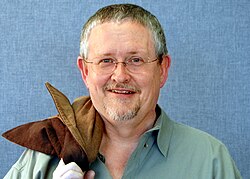Orson Scott Card Quote
They must talk to each other directly, Ender, mind to mind. What one thinks, another can also think; what one remembers, another can also re-member. Why would they ever develop language? Why would they ever learn to read and write? How would they know what reading and writing were if they saw them? Or signals? Or numbers? Or anything that we use to communicate? This isn’t just a matter of translating from one language to another. They don’t have a language at all. We used every means we could think of to communicate with them, but they don’t even have the machinery to know we’re signaling. And maybe they’ve been trying to think to us, and they can’t understand why we don’t respond.
They must talk to each other directly, Ender, mind to mind. What one thinks, another can also think; what one remembers, another can also re-member. Why would they ever develop language? Why would they ever learn to read and write? How would they know what reading and writing were if they saw them? Or signals? Or numbers? Or anything that we use to communicate? This isn’t just a matter of translating from one language to another. They don’t have a language at all. We used every means we could think of to communicate with them, but they don’t even have the machinery to know we’re signaling. And maybe they’ve been trying to think to us, and they can’t understand why we don’t respond.
Related Quotes
Language and hearing are seated in the cerebral cortex, the folded gray matter that covers the first couple of millimeters of the outer brain like wrapping paper. When one experiences silence, absent...
About Orson Scott Card
Card, who is a great-great-grandson of Brigham Young, was born in Richland, Washington, and grew up in Utah and California. While he was a student at Brigham Young University (BYU), his plays were performed on stage. He served in Brazil as a missionary for the Church of Jesus Christ of Latter-day Saints (LDS Church) and headed a community theater for two summers. Card had 27 short stories published between 1978 and 1979, and he won the John W. Campbell Award for best new writer in 1978. He earned a master's degree in English from the University of Utah in 1981 and wrote novels in science fiction, fantasy, nonfiction, and historical fiction genres starting in 1979. Card continued to write prolifically, and he has published over 50 novels and 45 short stories.
Card teaches English at Southern Virginia University; he has written two books on creative writing and serves as a judge in the Writers of the Future contest. He has taught many successful writers at his "literary boot camps".
